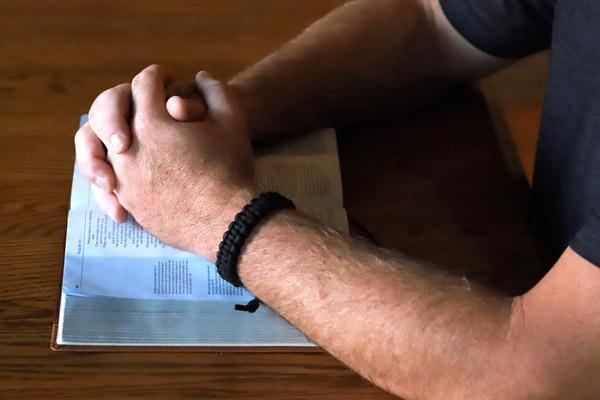
Looking for a prayer style that is right for you? Here are five time-tested, tried and true ways to pray.
Developed by St. Ignatius of Loyla, Ignatian prayer focuses on developing an intimate relationship with God through reflection.
His Spiritual Exercises “are a compilation of meditations, prayers and contemplative practices” that can be used in retreat form or individual growth. According to ignatianspirituality.com, the exercises are organized into four weeks, but can last longer, with different goals each week.
The Daily Examen reflects on the day’s events and God’s presence in them. Born from the Spiritual Exercises, ignatianspirituality.com stated it includes five steps: “Become aware of God’s presence; review the day with gratitude; pay attention to your emotions; choose one feature of the day and pray from it; look toward tomorrow.”
•••
To become more acquainted with Ignatian prayer, consider a silent retreat lasting four or eight days up to 30 days. They are guided by a spiritual director. Before the pandemic, the Diocese of Little Rock hosted a four-day Ignatian silent retreat in Little Rock each year.
•••
Through the intercession of the Blessed Mother, the rosary helps people reflect on the life of Jesus at various stages in his life.
The mysteries are to be said on specific days: Joyful (Monday and Saturday), Sorrowful (Tuesday and Friday), Glorious (Wednesday and Sunday) and Luminous (Thursday).
During Lent, the Sorrowful mysteries can be prayed on Sundays.
Also called “The Divine Office,” according to the United States Conference of Catholic Bishops, “The Hours are a meditative dialogue on the mystery of Christ, using Scripture and prayer.”
There are five canonical hours, with morning and evening prayer as the most important. Ordained and vowed religious pray it daily, but it is also open to anyone to pray and it usually takes about 15 to 20 minutes.
According to jesuitpost.org, “We call it a liturgy because it is a public prayer of the Church (like Mass or the other sacraments), which includes hymns, psalms, readings and prayers according to the liturgical calendar. The Church distinguishes liturgy, which is public prayer, from private devotions, like praying the rosary.”
Translated as “Divine Reading,” this form of meditative prayer is one of the earliest in the Church. St. Benedict made it regular practice for monasteries by the sixth century.
It can begin with a short prayer before picking a Scripture passage, following the guidance of read, reflect (which can include journaling), respond and rest.
According to Loyolapress.com, “You pick a passage and read it. Notice what arises within you as you read it. Then you read it again, and then again, noticing what words and phrases grab your heart and noticing the feelings that arise. You respond to God about whatever is stirring within as you read and pray with the passage. Finally, you rest and let God respond and speak to you.”
According to the USCCB, “Popular devotions are expressions of love and fidelity that arise from the intersection of one's own faith, culture and the Gospel of Jesus Christ.”
There are several popular Catholic devotions including to the Eucharist, to the Blessed Virgin Mary, to saints and to the Sacred Heart of Jesus. Devotions can be expressed through formalized prayer including novenas and adoration, or through activities that don’t include formal prayer such as creating a Marian garden.
The USCCB states, “Properly used, popular devotional practices do not replace the liturgical life of the Church; rather, they extend it into daily life.”
Please read our Comments Policy before posting.
Article comments powered by Disqus Tenebrae service reminds faithful of Jesus’ suffering
Tenebrae service reminds faithful of Jesus’ suffering
 Arkansas Catholic Lenten quiz answers
Arkansas Catholic Lenten quiz answers
 Pope: For Lent, put appearances aside and listen to God
Pope: For Lent, put appearances aside and listen to God
 Test your knowledge: Arkansas Catholic’s Lenten Quiz
Test your knowledge: Arkansas Catholic’s Lenten Quiz
 How to create a more prayerful life this Lenten season
How to create a more prayerful life this Lenten season
 Winning directory photo honors Our Lady of Guadalupe
Winning directory photo honors Our Lady of Guadalupe
 St. Paul says: How does the Bible define love?
St. Paul says: How does the Bible define love?
 6 steps to getting married in Diocese of Little Rock
6 steps to getting married in Diocese of Little Rock
 Most frequently asked questions on Catholic marriage
Most frequently asked questions on Catholic marriage
 St. Joseph a model of solidarity with immigrants
St. Joseph a model of solidarity with immigrants
 Two gifts after Jesus’ death: Virgin Mary and Eucharist
Two gifts after Jesus’ death: Virgin Mary and Eucharist
 Why we have an altar, and not just a communion table
Why we have an altar, and not just a communion table
 Pope: Wars should be resolved through nonviolence
Pope: Wars should be resolved through nonviolence
 Living relationship with Jesus Christ in the Eucharist
Living relationship with Jesus Christ in the Eucharist